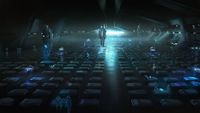Citadel Charum: Difference between revisions
From Halopedia, the Halo wiki
Halopediaman (talk | contribs) m (Updated source format to new regulations.) |
Halopediaman (talk | contribs) m (Converted Halo: Silentium's page source to string.) |
||
| Line 5: | Line 5: | ||
As the final planetary defenses collapsed and their defeat became inevitable, the last surviving humans gathered in the Citadel on Charum Hakkor. One by one the wounded, the dying, and the captured were laid out on rows upon hundreds of rows of beds inside the citadel. In an attempt to conceal their identities and ranks from the [[Forerunner]]s, the Admiralty had stripped off their uniforms. Despite this, the [[Ur-Didact|Didact]] was able to identify his greatest opponent — [[Forthencho]], the Lord of Admirals.<ref>''Halo: Primordium'', page 233-234</ref> | As the final planetary defenses collapsed and their defeat became inevitable, the last surviving humans gathered in the Citadel on Charum Hakkor. One by one the wounded, the dying, and the captured were laid out on rows upon hundreds of rows of beds inside the citadel. In an attempt to conceal their identities and ranks from the [[Forerunner]]s, the Admiralty had stripped off their uniforms. Despite this, the [[Ur-Didact|Didact]] was able to identify his greatest opponent — [[Forthencho]], the Lord of Admirals.<ref>''Halo: Primordium'', page 233-234</ref> | ||
Furious at humanity, the [[Ecumene Council|Old Council]] (primarily composed of [[Builder]]s) had originally ordered the complete annihilation of the human race despite being convinced that they knew of a cure against the [[Flood]].<ref>''Halo: Silentium'', | Furious at humanity, the [[Ecumene Council|Old Council]] (primarily composed of [[Builder]]s) had originally ordered the complete annihilation of the human race despite being convinced that they knew of a cure against the [[Flood]].<ref name="ss3">''Halo: Silentium'', String 3</ref> The [[Librarian]] insisted that humanity and their culture needed to be spared, as this might be the only way for the Forerunners to decipher their apparent Flood immunity. The Council yielded to this request, though only in part; after the Librarian and her [[Lifeworker]]s had thoroughly studied the human survivors down to a molecular level, their mental patterns were to be extracted via [[Composer]]s for further analysis. Inside the citadel, the Librarian and her Lifeworkers walked among the human survivors, providing relief before their imminent composition. Forthencho, [[Yprin Yprikushma]], the Admiralty, and numerous other human warriors (along with their children and families) were then processed by the Composers, destroying their bodies but storing their memories and consciousnesses in digital form.<ref name="ss3"/> | ||
The Citadel, like all other Precursor structures on the planet, was destroyed when [[Master Builder]] [[Faber]] and the [[ancilla]] [[Mendicant Bias]] test-fired [[Halo Array|Halo]] [[Installation 07]] in [[Charum Hakkor system|the system]] in [[100,043 BCE]].<ref>''Halo: Primordium'', pages 190-192</ref> | The Citadel, like all other Precursor structures on the planet, was destroyed when [[Master Builder]] [[Faber]] and the [[ancilla]] [[Mendicant Bias]] test-fired [[Halo Array|Halo]] [[Installation 07]] in [[Charum Hakkor system|the system]] in [[100,043 BCE]].<ref>''Halo: Primordium'', pages 190-192</ref> | ||
Revision as of 15:30, January 15, 2020
Citadel Charum was a grand Precursor structure on Charum Hakkor. Prehistoric humans considered it to be the greatest Precursor ruin on the planet by the end of the human-Forerunner wars.[1]
History
As the final planetary defenses collapsed and their defeat became inevitable, the last surviving humans gathered in the Citadel on Charum Hakkor. One by one the wounded, the dying, and the captured were laid out on rows upon hundreds of rows of beds inside the citadel. In an attempt to conceal their identities and ranks from the Forerunners, the Admiralty had stripped off their uniforms. Despite this, the Didact was able to identify his greatest opponent — Forthencho, the Lord of Admirals.[2]
Furious at humanity, the Old Council (primarily composed of Builders) had originally ordered the complete annihilation of the human race despite being convinced that they knew of a cure against the Flood.[3] The Librarian insisted that humanity and their culture needed to be spared, as this might be the only way for the Forerunners to decipher their apparent Flood immunity. The Council yielded to this request, though only in part; after the Librarian and her Lifeworkers had thoroughly studied the human survivors down to a molecular level, their mental patterns were to be extracted via Composers for further analysis. Inside the citadel, the Librarian and her Lifeworkers walked among the human survivors, providing relief before their imminent composition. Forthencho, Yprin Yprikushma, the Admiralty, and numerous other human warriors (along with their children and families) were then processed by the Composers, destroying their bodies but storing their memories and consciousnesses in digital form.[3]
The Citadel, like all other Precursor structures on the planet, was destroyed when Master Builder Faber and the ancilla Mendicant Bias test-fired Halo Installation 07 in the system in 100,043 BCE.[4]
Gallery
List of appearances
- Halo: Primordium (First appearance)
- Halo 4
- Halo: Silentium (Indirect mention)

